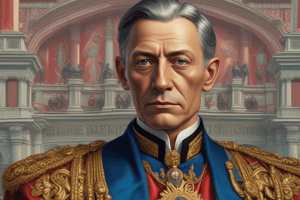Podcast
Questions and Answers
In a unitary system, power is held by:
In a unitary system, power is held by:
- Regional governments
- The central government (correct)
- The people or their elected representatives
- Independent states
What type of government is characterized by a king or queen holding significant power?
What type of government is characterized by a king or queen holding significant power?
- Authoritarian
- Republic
- Totalitarian
- Monarchy (correct)
Which branch of government makes laws?
Which branch of government makes laws?
- Executive
- Judicial
- Administrative
- Legislative (correct)
What is the term for a system where power is divided between a central government and smaller regional governments?
What is the term for a system where power is divided between a central government and smaller regional governments?
Which system of government is characterized by a mix of presidential and parliamentary systems?
Which system of government is characterized by a mix of presidential and parliamentary systems?
What is the term for a government formed when no single party holds a majority of seats in the legislature?
What is the term for a government formed when no single party holds a majority of seats in the legislature?
What factor can affect the stability of a government?
What factor can affect the stability of a government?
What type of government is characterized by a single person or group holding complete control, often without free elections?
What type of government is characterized by a single person or group holding complete control, often without free elections?
Flashcards are hidden until you start studying
Study Notes
Government Formation
Types of Governments
- Unitary System: Power is held by the central government, which makes decisions for the entire country.
- Federal System: Power is divided between a central government and smaller regional governments.
- Confederal System: A loose alliance of independent states that cooperate on certain matters.
Forms of Government
- Monarchy: A king or queen holds significant power, often hereditary.
- Republic: Power is held by the people or their elected representatives.
- Authoritarian: A single person or group holds complete control, often without free elections.
- Totalitarian: A highly centralized and controlled government that seeks to regulate all aspects of citizens' lives.
Government Branches
- Legislative: Makes laws, often comprising a parliament or congress.
- Executive: Enforces laws, headed by a president or prime minister.
- Judicial: Interprets laws, comprising a system of courts.
Systems of Government
- Presidential System: The president serves as both head of state and head of government.
- Parliamentary System: The prime minister serves as head of government, while a separate head of state (e.g., monarch) exists.
- Semi-Presidential System: A mix of presidential and parliamentary systems, where the president and prime minister share power.
Coalition Governments
- Formed when no single party holds a majority of seats in the legislature.
- Parties negotiate to form a governing coalition, often with policy compromises.
Government Stability
- Factors affecting stability:
- Political culture and history
- Institutional design (e.g., electoral systems)
- Economic conditions
- International relations and pressures
Government Formation
Types of Governments
- In a Unitary System, the central government possesses all the power and makes decisions for the entire country.
- A Federal System divides power between a central government and smaller regional governments, which have some autonomy.
- A Confederal System is a loose alliance of independent states that cooperate on certain matters, but each state retains significant power.
Forms of Government
- A Monarchy is a system where a king or queen holds significant power, often inherited through family.
- In a Republic, power is held by the people or their elected representatives, and leaders are usually chosen through elections.
- An Authoritarian government is characterized by a single person or group holding complete control, often without free elections.
- A Totalitarian government is a highly centralized and controlled system that seeks to regulate all aspects of citizens' lives.
Government Branches
- The Legislative branch is responsible for making laws, often comprising a parliament or congress.
- The Executive branch is responsible for enforcing laws, headed by a president or prime minister.
- The Judicial branch is responsible for interpreting laws, comprising a system of courts.
Systems of Government
- In a Presidential System, the president serves as both the head of state and head of government.
- In a Parliamentary System, the prime minister serves as the head of government, while a separate head of state (e.g., monarch) exists.
- A Semi-Presidential System is a mix of presidential and parliamentary systems, where the president and prime minister share power.
Coalition Governments
- A Coalition Government is formed when no single party holds a majority of seats in the legislature.
- Parties must negotiate to form a governing coalition, often with policy compromises.
Government Stability
- Factors affecting government stability include:
- Political culture and history
- Institutional design (e.g., electoral systems)
- Economic conditions
- International relations and pressures
Studying That Suits You
Use AI to generate personalized quizzes and flashcards to suit your learning preferences.



